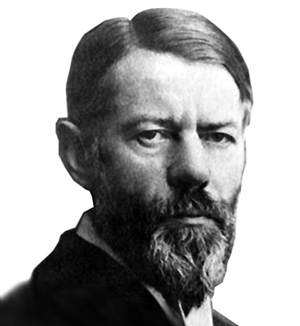
Karl Emil Maximilian "Max" Weber (April 21, 1864 - June 14, 1920) was a German sociologist, philosopher, and political economist whose ideas profoundly influenced social theory and social research. Weber is often cited, with Émile Durkheim and Karl Marx, as among the three founders of sociology. (Click here for full Wikipedia article)
-----
The fate of our times is characterized by rationalization and intellectualization and, above all, by the disenchantment of the world.
Power is the chance to impose your will within a social context, even when opposed and regardless of the integrity of that chance.
'Culture' is a finite segment of the meaningless infinity of the world process, a segment on which human beings confer meaning and significance.
All the analysis of infinite reality which the finite human mind can conduct rests on the tacit assumption that only a finite portion of this reality constitutes the object of scientific investigation, and that only it is 'important' in the sense of being 'worthy of being known.'
All knowledge of cultural reality, as may be seen, is always knowledge from particular points of view.
Social economic problems do not exist everywhere that an economic event plays a role as cause or effect- since problems arise only where the significance of those factors is problematical and can be precisely determined only through the application of methods of social-economics.
The modern view of criminal justice, broadly, is that public concern with morality or expediency decrees expiation for the violation of a norm; this concern finds expression in the infliction of punishment on the evil doer by agents of the state, the evil doer, however, enjoying the protection of a regular procedure.
It is not true that good can only follow from good and evil only from evil, but that often the opposite is true.
Within the confines of the lecture hall, no other virtue exists but plain intellectual integrity.
The career of politics grants a feeling of power. The knowledge of influencing men, of participating in power over them, and above all, the feeling of holding in one's hands a nerve fiber of historically important events can elevate the professional politician above everyday routine even when he is placed in formally modest positions.
Certainly all historical experience confirms the truth- that man would not have attained the possible unless time and again he had reached out for the impossible.
The ethic of conviction and the ethic of responsibility are not opposites. They are complementary to one another.
Not everyone realizes that to write a really good piece of journalism is at least as demanding intellectually as the achievement of any scholar.
Causal analysis provides absolutely no value judgment, and a value judgment is absolutely not a causal explanation.
Only by strict specialization can the scientific worker become fully conscious, for once and perhaps never again in his lifetime, that he has achieved something that will endure. A really definitive and good accomplishment is today always a specialized act.
The primary task of a useful teacher is to teach his students to recognize 'inconvenient' facts- I mean facts that are inconvenient for their party opinions.
Politics is a strong and slow boring of hard boards.
Either one lives 'for' politics or one lives 'off' politics.
Politics means striving to share power or striving to influence the distribution of power, either among states or among groups within a state.
Whenever known and sufficient causes are available, it is anti- scientific to discard them in favour of a hypothesis that can never be verified.
Laws are important and valuable in the exact natural sciences, in the measure that those sciences are universally valid.
One cannot prescribe to anyone whether he should follow an ethic of absolute ends or an ethic of responsibility.
It is not astonishing that there are many journalists who have become human failures and worthless men. Rather, it is astonishing that, despite all this, this very stratum includes such a great number of valuable and quite genuine men, a fact that outsiders would not so easily guess.
In a democracy the people choose a leader in whom they trust. Then the chosen leader says, 'Now shut up and obey me.' People and party are then no longer free to interfere in his business.
The ultimately possible attitudes toward life are irreconcilable, and hence their struggle can never be brought to a final conclusion.
Under the technical and social conditions of rational culture, an imitation of the life of Buddha, Jesus, or Francis seems condemned to failure for purely external reasons.
-----
(April 21 is also the birthday of Rollo May.)
Categories: Max Weber, Quotes of the day
Home KGB on Bluesky KGB on Substack
KGB Stuff Commentwear E-Mail KGB
Donate via PayPal

















